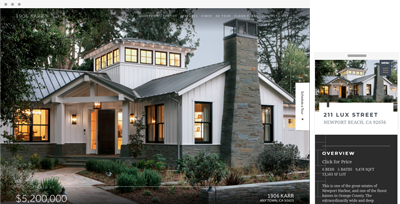Listing syndication is dead.
Yes, you heard us.
In the not-so-distant past, listing syndication, or the process of getting a home listing posted to several sites around the internet, was the only way realtors could get the word out about a property. Dozens of sites that aggregated listings for potential homebuyers to find homes dotted the online landscape. Realtors clamored to these sites in an effort to cast a broad marketing net.
Listing Syndication...?
Fast forward to 2017 where there are two listing aggregators that dominate the market - Zillow and Realtor.com. If your listing is already on the MLS, chances are it is already on both of these real estate juggernaut sites. Zillow boasts more than 160 million monthly visitors, half of which are looking to purchase a home sometime in the next 12 months. The Zillow Group, which includes sites like Zillow, Trulia, HotPads, and Naked Apartments, currently represents three-quarters of the total mobile-listing real estate market. While Realtor.com has an average of 53 million unique monthly visits, they have experienced a 15 percent increase in traffic year over year. As they continue to retool their design and add unique content, they will only continue to grow in their market share. The need to syndicate a listing beyond these two sites is negligible. So, how do agents not only get their listing into the hands of those that want it, but also differentiate it from the millions of others flooding aggregate sites?
Social Media is Begging for Syndication
Facebook, Twitter, LinkedIn, and Instagram have an audience that is largely untapped by the aggregate giants. Using these channels to promote and syndicate listings can not only add an additional market, they can allow for feedback and interaction with potential homebuyers. Facebook alone has 1.94 billion monthly active users. Since acquiring Instagram, they have expanded their reach to an additional 700 million monthly active users giving them the largest active social media platform on the market. Twitter has 328 million monthly active users but has experienced a sudden jump in daily active users as of the beginning of 2017. LinkedIn, the app that many people often overlook, has 500 million active users with data on more than 9 million companies. Microsoft acquired the professional networking site in April of this year with its eye on capturing the business marketing sector of the social media market. Together, social media platforms represent a largely untapped group of potential homebuyers through which to share listings. However, with more than 130 million small businesses flooding Facebook and the typical audience engagement hovering around 2 percent, it becomes discouraging to devote time to social media marketing when you don't know where to start.
Use Audience Targeting
Ever wondered how your social media network knew you were looking at real estate online? The process of gathering information based on searches and interactions is not new. Since the dawn of the web browser, personal information has been collected by its billions of users. Social media platforms are particularly adept at using this collected information in something called audience targeting. Those who are already using their search engine to look up real estate listings will suddenly see ads on their newsfeed for particular listings, agents or real estate information sites that have paid to have their ads reach potential homebuyers. With the ability to tailor a message to someone in a particular area, in a particular phase of the buyer or seller journey, audience targeting gives agents an opportunity to appear as though their message is meant for them. Someone who has just closed on a home would not want to receive ads or emails about the latest listings in their area. By the same token, buyers in Boston would not necessarily want to see homes for sale in Miami. Audience targeting eliminates the need for broad, generalized marketing messages that blanket the market.
Let an Ad Manager Do it For You
It is possible for an agent to do all of their social media marketing on their own but they will be the first to tell you that their time is better spent elsewhere. social media ad manager platforms and standard social media sharing tools are key to marketing a listing without spending valuable time doing so. Anchored in single listing websites rather than vast, clumsy aggregates, Rela offers a Facebook ad manager platform that not only takes the guess work out of social media marketing, it allows agents to engage with potential and existing clients through their existing social networks. Best of all, Rela offers an interactive analytics dashboard that shows agents how many visitors are coming to their single listing sites and how they found it. This information is crucial to developing a marketing plan that meets the needs of the homebuyer as well as the seller.
For all the emphasis on a variety of aggregate sites a decade ago, social media syndication is disrupting standard marketing procedures in real estate. Not only is it essential to distribute a listing to a ready-made audience of potential clients, it offers agents an opportunity to tailor their message to people in a particular stage of their buying or selling journey.




